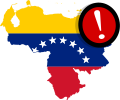
Back العقوبات الدولية خلال الأزمة الفنزويلية Arabic Sanciones internacionales durante la crisis en Venezuela Spanish Sanctions contre le Venezuela French Sanções contra a Venezuela Portuguese

During the crisis in Venezuela, governments of the United States, the European Union (E.U.), Canada, Mexico, Panama and Switzerland have applied sanctions against Venezuela, as well as against specific government entities and individuals associated with the administration of Nicolás Maduro. Through April 2019, the U.S. sanctioned more than 150 companies, vessels and individuals, in addition to revoking visas of 718 individuals associated with Maduro.[1] By September 2019, the Center for Strategic and International Studies said 119 Venezuelans had been sanctioned by the U.S. and several other countries.[2]
Early sanctions came in response to repression during the 2014 and the 2017 Venezuelan protests, and activities both during the 2017 Constituent Assembly election and the 2018 presidential election. Sanctions were placed on current and former government officials, including members of the Supreme Tribunal of Justice (TSJ) and the 2017 Constituent National Assembly (ANC), members of the military and security forces, and private individuals accused of being involved in human rights abuses, corruption, degradation in the rule of law and repression of democracy. In March 2015, the Obama administration imposed asset and visa sanctions against 110 Venezuelan individuals, and eight entities;[3] in August 2017, the Trump administration imposed sanctions which prohibited Venezuela's access to U.S. financial markets, and in May 2018, expanded them to block purchase of Venezuelan debt.[3]
Beginning in January 2019, during the Venezuelan presidential crisis, the U.S. applied additional economic sanctions to individuals or companies in the petroleum, gold, mining, and banking industries and a food subsidy program. Companies in the petroleum sector evaded the PDVSA sanctions to continue oil shipments. In October 2023, the administration of Joe Biden temporarily lifted some U.S. sanctions on the oil, gas and gold industries in exchange for the promise of the release of political prisoners and free 2024 elections;[4] the sanctions were reimposed in April when the U.S. State Department said the Barbados Agreement to hold free elections had not been fully honored.[5]
| Crisis in Venezuela |
|---|
 |
|
|
- ^ "Treasury sanctions Venezuelan business to isolate Maduro". AP News. 12 April 2019. Retrieved 12 April 2019.
- ^ Cite error: The named reference
CSISwas invoked but never defined (see the help page). - ^ a b "Venezuela: Overview of U.S. Sanctions Policy" (PDF). Congressional Research Service. 26 January 2024. Archived from the original (PDF) on 16 March 2024.
- ^ "Venezuela: Political Crisis and U.S. Policy" (PDF). Congressional Research Service. 10 March 2021. Retrieved 30 October 2023.
- ^ Cite error: The named reference
Reimposewas invoked but never defined (see the help page).